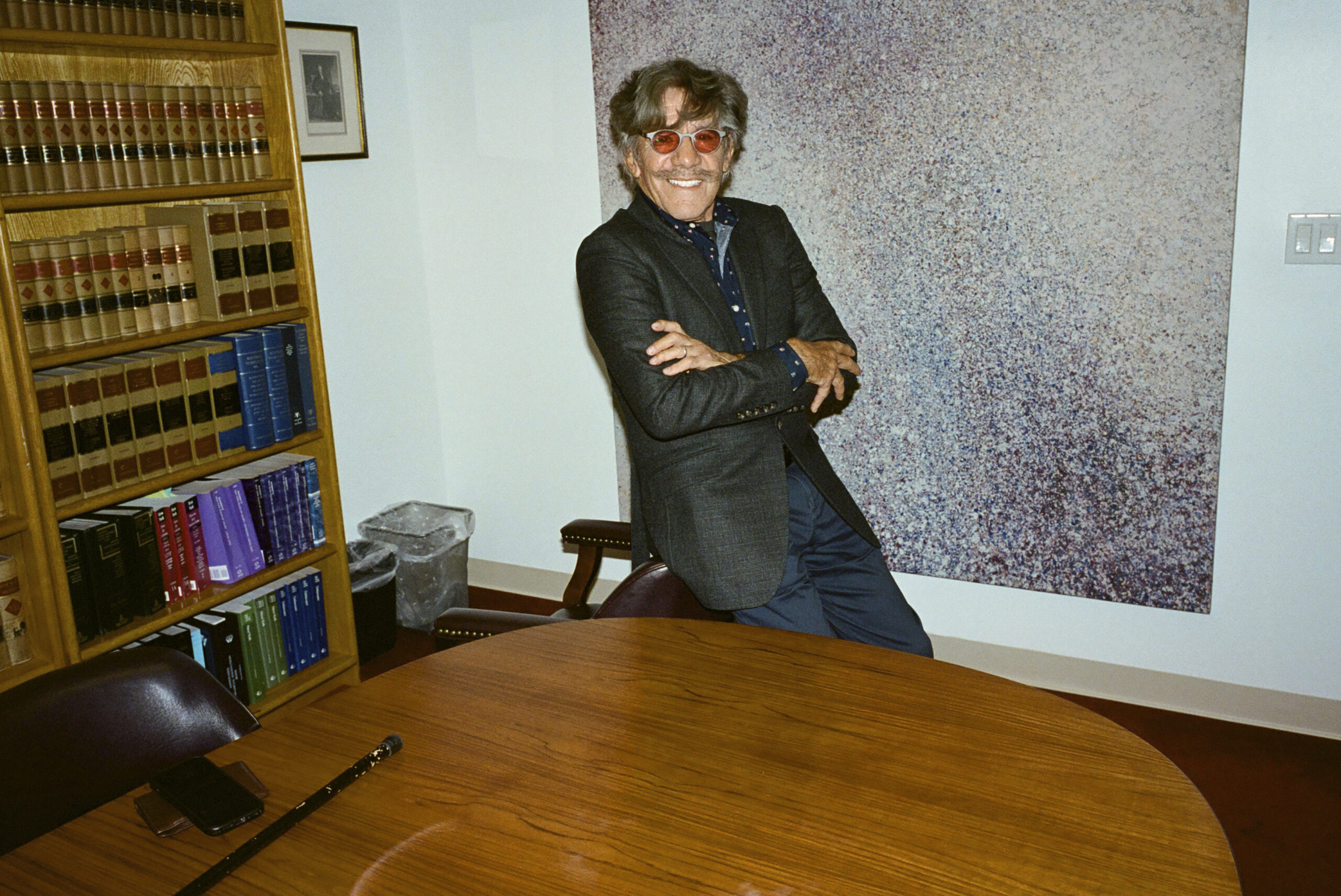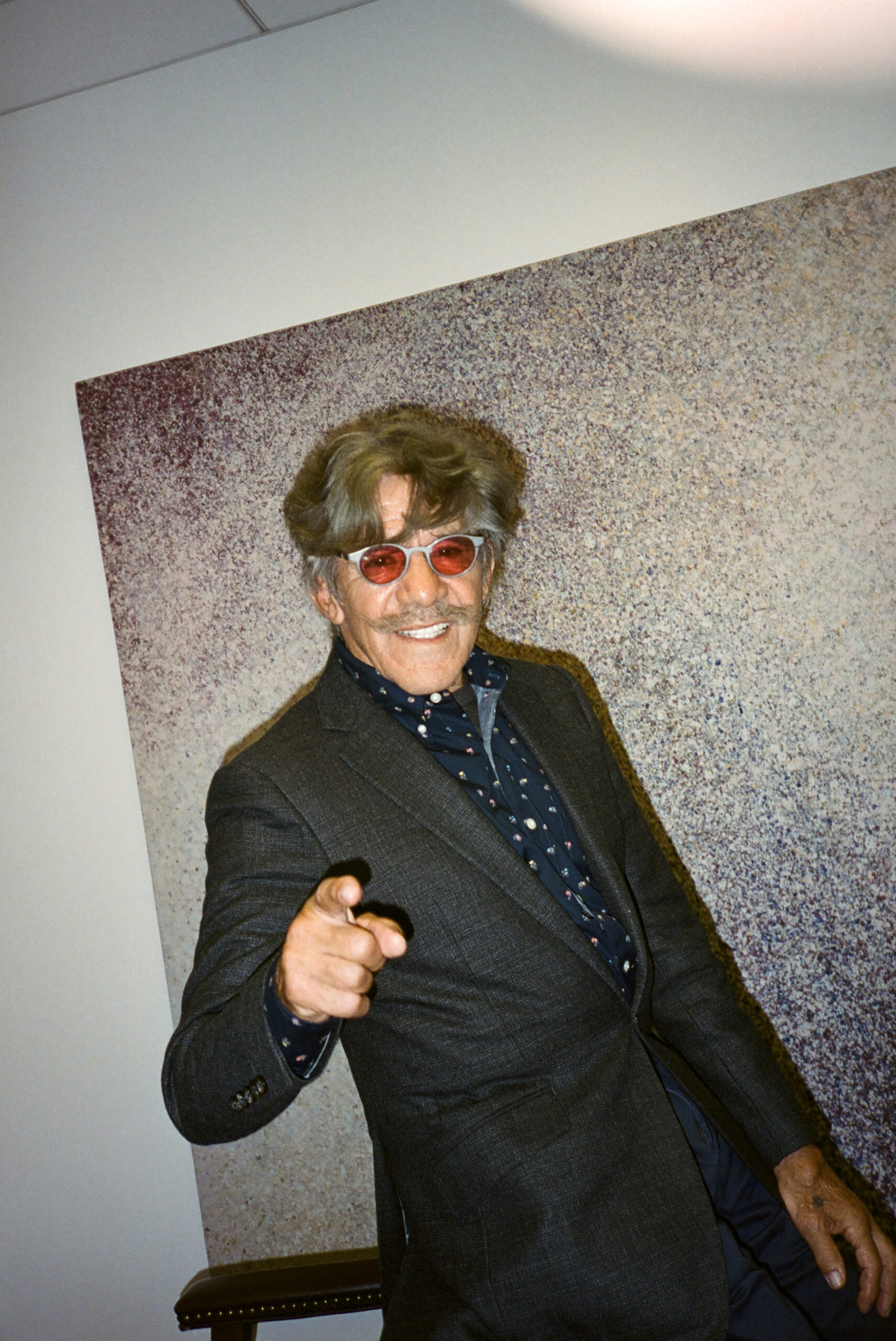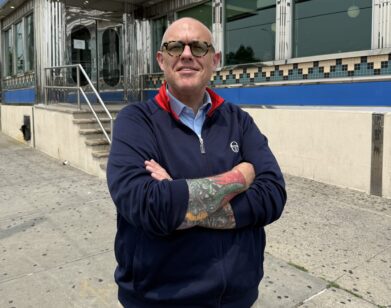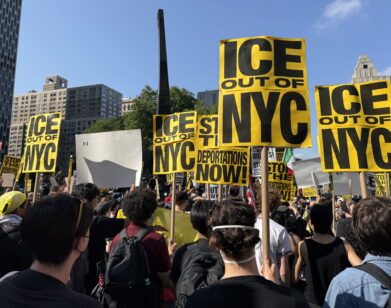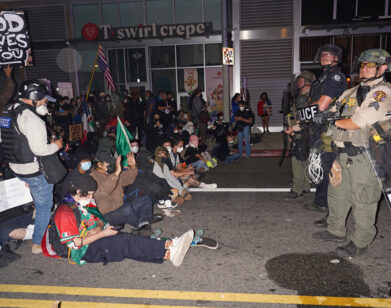POLITICS
Geraldo Rivera Tells Us Why He Finally Turned On His Old Friend Donald Trump
Veteran newscaster Geraldo Rivera first crossed paths with Donald Trump in the 1970s, when the man who’d become the 45th President of the United States was merely a landlord rising from the ashes of a city beleaguered by crime and rampant inequality. “Trump existed almost in his own orbit,” recalls Rivera. “He was the first rich guy I ever knew.” The two would maintain a friendly relationship over the ensuing decades, with Rivera serving as something of a confidante to Trump during his first term as president despite not voting for him in the 2016 election. But the events of January 6th, and Trump’s generally odious remarks about immigrants and women, have since caused the former Fox News host to sour on his old friend, so much so that Rivera formally endorsed Kamala Harris on Twitter in what qualified as a full-scale renouncement of the Republican nominee’s character. Earlier this week, journalist Molly Jong-Fast called Rivera to find out why he thinks a second Trump term would be catastrophic.
———
MOLLY JONG-FAST: You have endorsed Vice President Harris. You are a longtime Republican. You are often a host on Fox News. Talk us through this decision.
GERALDO RIVERA: Well, the president frequently called here at home during his tenure. Our relationship dated back to the 1970s, when he was coming up in the real estate business. I met him when he was trying to rehabilitate the old Commodore Hotel on 42nd Street, which was a haven for junkies and hookers and crime and the rest of it. And he succeeded. I chronicled that in many ways. We went to the fights together, hung out at Trump Tower. Fox was just a few blocks away. I did not vote for him in 2016, but I supported him. And he was very generous, very gracious, inviting me to the White House, giving me access interviews. I did several hour-long interviews with him during his presidency. During the tumultuous four years, I defended him against what I thought was an unfair onslaught on the Russia business. And generally speaking, I was supportive and believed that his first administration was underrated in many ways. And he was besieged. I believe Bill Barr played a pivotal role in preserving his administration without him going nuts. Because at certain times he was so emotional and so fraught and distraught by the various attacks. They wanted to impeach him before he even took office.
JONG-FAST: Right.
RIVERA: Jump cut to the election of 2020. You had a situation there where the election happened, the results were trickling in. There were extraordinary circumstances with the pandemic and so forth. And he refused to concede that whole first week. I became more and more uncomfortable with his refusal to concede, with his refusal to accept what was becoming increasingly obvious, which is that he had lost the election. So on Friday the 13th of November, the president called me here and I was very consoling. My attitude was, “I’m sorry, good fight. You’ll get them next time.” And he kind of stopped me and said, “Wait, it’s not over until it’s over.” He mentioned some controversies that he had heard of. And I said, “What are you going to do?” And he said, “I’m a reasonable man. And if that’s the way it turns out, that’s the way it turns out.” My impression, as I reported that very day within an hour on Fox News, was essentially that if push came to shove and it was obvious that he had lost, he would concede. So I was comforted by his apparent reasonableness that he wasn’t going to be an asshole about it. It didn’t turn out that way. Every day he got worse and worse, more and more radicalized. The people around him increasingly a motley crew: Steve Bannon, Roger Stone, General Mike Flynn, just fringy kind of people. And he dug in. He went to Georgia, if you recall, beat the Republican Party’s chances for the Senate there with his irrational behavior and his narcissism. Then, of course, you get to January 6th, when it seemed to me that he incited and then unleashed the attack on the United States Capitol, the soul of our democracy, in his flamboyantly irrational and illegal assault on democracy itself. Aside from the riot, he attempted to strong-arm Mike Pence, the Vice President, whose job was the kind of symbolic certification of the electoral college vote. And he tried to make Pence be more loyal to him than to the Constitution and [carry out] this cockamamie idea to go back to the electors of the various states. Then he was putting together alternate slates of electors and all this mess. So on January 7th, I joined in calling for his impeachment. It was the end of our friendship, the end of the relationship, and it was a great loss to me. But he demonstrated then he was a sore loser who could not be trusted to honor the Constitution, Molly.
JONG-FAST: Yeah.
RIVERA: My endorsement of Kamala Harris is going to come in two parts. I’ll tell you next week why I think she’s qualified to be president. I do think she’s qualified to be president. I think she’d be a terrific president. But my first installment was why Donald Trump is unfit for office. And that’s what my essay indicated. So I feel a loss of a friendship, but it’s been over three years in the making and I’ve decided that it’s not enough for me just to be against Trump. I want to be for somebody, and I think Kamala Harris would be a terrific president.
JONG-FAST: I want you to talk to us about what it means. You knew Trump. When you called for his impeachment, what was happening in your head and did you think he had changed? Or did you just realize that that power had made him fundamentally incapable of making decisions for the good of the country?
RIVERA: Donald Trump played by his own rules, always. I mean, the Rosie O’Donnell flap where Trump was the head of the Miss Universe Pageant and one of the contestants had a checkered past that was secret and was revealed. And Trump said, “We will forgive her,” being magnanimous in his own clumsy way. And he went after Rosie O’Donnell. He called her all these names, fat and ugly and this and that. He called me over to the Trump Tower to reinforce how pissed off he was. That was a harbinger. I look back and say that behavior toward Rosie O’Donnell denoted a kind of Trump that was becoming increasingly “win at all costs,” who would tolerate no dissenting opinions. But still, even when the Russia investigation happened, he seemed increasingly beleaguered by outside forces that he could no longer control despite his bravado. It was worrisome, to an extent. But as I said, he’d settled down eventually, thanks to Bill Barr. He settled down and had a pretty good presidency until the pandemic happened, of course. And that changed a lot of things. He’s brooding, Operation Warp Speed. Dealing with that was very difficult for him and for the country. Everybody was kind of feeling that way, but he was not bad. And I maintain that if the vaccine had been developed a couple of months earlier, I think he would’ve been triumphant. But as it was, the vaccine didn’t come until after the election, and that kind of exacerbated his decline into irrationality because of these forces that he could no longer control. At times he’d embrace the medical experts. Other times he’d reject them. At times he embraced China, then he’d reject them. Once he was out of office and went into exile in Mar-a-Lago, he was simmering. It was like Lord of the Rings, really, like Sauron mustering his forces and plotting revenge, this dark force kind of metastasizing. He became the stereotype that so many had feared that I was blind to, that I did not see.
JONG-FAST: Right.
RIVERA: I think the real story is, Trump’s Trump. He’s larger than life. He’s one in a million. How he managed to convince so many reasonable, normal, ordinary Republicans that he had been robbed in the election against all evidence, against all rational thinking, against every finding from every legislative body that investigated [and concluded] that there was absolutely no evidence of any kind of massive theft of the election. He made liars of every Republican in the country. They kind of brushed off January 6th as one bad day, as if it was nothing. It was like he had been propagandizing them or brainwashing them. And then slowly, slowly, slowly, they came to the position where, “Yes, Trump was robbed. Democrats robbed elections. I’m voting for Trump.” Because tax policy, defense policy; whatever reason it is. I mean, it would be better in my view if people admitted that he did not get robbed in the election and admitted that he lost the election. But they didn’t do that. Too many of them just kind of went along with what was essentially a false narrative that consoled them but ultimately was tragic in the sense that he was unfit to run for office. And now he stands on the precipice of a possible return to power, which, to me, is uncanny. It’s more like a science fiction movie than real life. But he has a reasonable chance of returning as the 47th president, and I think that woe is us.
JONG-FAST: He’s 78 years old, right?
RIVERA: Right.
JONG-FAST: Do you think that he is sort of mentally deteriorating?
RIVERA: That’s a good question. I don’t want to characterize that because I’ve done a lot of work in the area.
JONG-FAST: But does he seem like the same guy you knew when he was in the White House in 2016?
RIVERA: I would say unequivocally, no. His courting of the dark far right, his scapegoating of immigrants, particularly Latino immigrants, of brown people. His statements about, “I had to control urban disorder.” I don’t know anyone around him that’s counseling him to cool it because they have determined that the way to reelection is the demonization of Latin immigrants. And in fairness, Biden and Harris gave him the opening by a disastrous—
JONG-FAST: I just want to pause for a minute here, because Trump did get involved in politics through birtherism, right? Through the lie that Obama was not born in this country. And even in 2016 when he made his first speech, he said, “Mexicans are rapists and some I assume are good people.” He has been doing this shtick for a decade. It may have gotten worse, or become more clear to you what the end game is, but I want to just be mindful of that.
RIVERA: That’s absolutely fair and accurate. But I will say this. I was with him at the Correspondents dinner of 2011. The origin—
JONG-FAST: Will you talk us through that? Because so many people believe that is the moment that he decided he was going to run.
RIVERA: I believe that that is when he vowed to show them, “I will be president of the United States.” Obama was ruthless. He was talking about how Trump has great experience in the executive area. It’s difficult to choose Meatloaf over Dave Matthews. He’s going to have a jacuzzi on the south lawn of the White House and so forth.
JONG-FAST: Right.
RIVERA: Very, very insulting, very demeaning. And Trump was steaming. And I do believe that that played some role in his decision ultimately to seek the highest office in the land.
JONG-FAST: Were you sitting at his table?
RIVERA: No, I was sitting at a couple of tables over.
JONG-FAST: And when you talked to him, what did he say?
RIVERA: I had a full rear-view. He didn’t laugh. He didn’t think he was funny. You could tell he was pissed off. I may be reading into it, but it seemed to me that he was percolating a revenge plot. But again, I have to say that you mentioned how on the day he came down the golden escalator he said the Mexican immigrants were rapists, and some, he presumed, are good people. I remember watching that live in my office at Fox News, and I had my own staff around me, not the Fox guys. I had my own trusted staff who had been with me from pre-Fox days when we had Rivera Live on CNBC and the daytime talk show and so forth. As we watched, we were so enthusiastic about Trump running for president. I don’t know if you’ve ever been around power. It’s a real trip. It’s something when your hang-out buddy is running for president. And when he made that statement, we looked at each other like, “nah, nah, nah, nah.” In retrospect, I think that he saw that issue from the response to that offhand ugly pejorative remark. I drew a straight line from that to his victory in 2016. He saw that that was the way. First it was birtherism that just undermined Obama, but most people dismissed it. Or if they believed it, they didn’t admit it, not in my circle anyway. But he played it. I don’t think that that was a big issue for him during his presidency, but he certainly has become absolutely identified with the anti-Latino immigrant movement.
JONG-FAST: When you heard that were you like, “This is just Trump being Trump. He doesn’t really believe it.”
RIVERA: Yes.
JONG-FAST: This is the way he’s going to get elected.
RIVERA: To the extent that I thought that deeply about it, other than being momentarily embarrassed. But yes, that’s what I felt.
JONG-FAST: And now, a decade later, you feel like this is actually what he believes now.
RIVERA: I believe there were obviously some high profile cases, Molly Tibbetts and then Laken Riley and so forth. The way he has played these and exploited these and generalized from these tragic incidents is beyond the pale, I think. I have three basic areas with Trump. Number one is the constitutional area.
JONG-FAST: And that’s why you ultimately broke with him in 2020.
RIVERA: The other one is that Erica [Levy, Rivera’s wife] and I have three daughters. And the notion that one of them might need reproductive healthcare, abortion or whatever.
JONG-FAST: Or even just pregnancy care in the first trimester.
RIVERA: It is appalling and we cannot abide it. I’m in Ohio now. Our main residence is here. So we have a constitutional right, state right in Ohio. But it was voted in and it could be voted out. So abortion, constitutional succession, and his treatment of Hispanic immigrants—those are my three big reasons for breaking with Trump.
JONG-FAST: And those are the reasons we see Republicans breaking with Trump. Like Liz Cheney, too. I don’t think Cheney is pro-choice, but she certainly does not want someone who is like, “The Constitution? Nah.”
RIVERA: She’s the hero of the day, Liz Cheney. [Adam] Kinzinger, too. But Liz Cheney was more of a profound break. And the fact that she took her dad along with her is magnificent and I honor them. And Mark Milley and [Mark[ Esper and all those people, you’ve got to listen to what they’re saying. They had the inside scoop that I didn’t and they just cannot abide the notion of him being in charge again.
JONG-FAST: You haven’t really talked to him since 2020, but you had a real relationship with him. Two days ago, he was supposedly doing a town hall and then somebody fainted and then another person fainted and then he just stopped doing the town hall completely and danced for 37 minutes. Does that seem like the Trump you knew?
RIVERA: No. I don’t know what that was. I watched it live and my thinking after some minutes had passed was, “Did somebody die?” It must’ve been very, very serious. And then I just changed the channel. I didn’t want to watch him just moving around and dancing around. And then to see all the news clips later that he did it for 37 minutes. I don’t know, it seems weird to me. I don’t know what the hell was going on. Regular people would not do that.
JONG-FAST: Yeah. Are you worried about reprisals from him or his people?
RIVERA: Am I worried about reprisals? I never had a moment’s thought of Trump coming after me or Trumpies behaving in illegal ways. I’m kind of a tough guy and I have tough guy friends. I have my own posse, my own gang. I’m not easy to intimidate or back down.
JONG-FAST: Good for you.
RIVERA: I’m more, “You should be afraid of me on the subway.” I don’t fear anything.
JONG-FAST: I want to talk about The Apprentice movie for two seconds. Have you seen it yet?
RIVERA: Erica saw it. I didn’t go. I said, “I saw it already.”
JONG-FAST: You lived it. But one of the things that struck me was how much he was a creature of this time in the 1970s and 1980s in New York, how you could sort of create your own history, make your own world. The city was very poor and anything you could do for it was very leveraged. He was able to get away with things that perhaps he wouldn’t have been able to get away with. Do you think that’s true?
RIVERA: We met in the ’70s and New York was a mess in many ways, a jungle. The subways just festooned with graffiti and darkness and the heroin epidemic was horrible. And junkies visibly nodding out. The city was at its worst. Abe Beame was the mayor—little guy, ineffective. And yet, when I look back on it, I lived at that time on Avenue C between 7th and 8th Street. I had parties down there. Mick Jagger came to my party, Rudolph Nureyev, Mayor John Lindsay, he’d come when he was mayor. It was like, when you lived it as a New Yorker, it wasn’t so ominous or foreboding. And Trump existed almost in his own orbit. He was the first rich guy I ever knew. I didn’t know anything about him as a landlord. He was a product. He took strength from the chaos and the anarchy and was a beacon of positivity—the casinos and this and that. He had so many different side gigs going on. Losing became winning with Trump.
JONG-FAST: Did you know Roy Cohn?
RIVERA: No. I mean, I may have met him in the early days, but I did not know him. I was part of the Studio 54 scene. And as I recall, he was involved with those guys. They went to jail on that tax rap.
JONG-FAST: Yes.
RIVERA: Life in New York was a Batman movie. Trump tried to be Batman and in part he succeeded.
JONG-FAST: You have three daughters.
RIVERA: I do.
JONG-FAST: You’re a girl dad, but you’re a tough guy. What is your message to other men who are Republicans but who are thinking about not supporting Trump this time because they have daughters? Or because of Trump’s anti-democracy stuff.
RIVERA: Don’t lie to yourself. To thine own self be true. You know that he lost the election, that his candidacy is based on a fraudulent premise, that he is unpredictable at best, irrational at worst. And if you empower him again, shame on you. I’m not going there.


